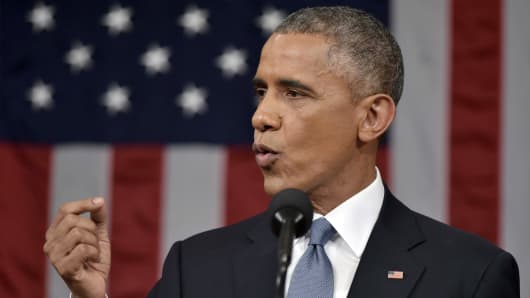By proposing a tax on U.S. multinationals' profits abroad, President Obama has boldly gone where no nation has dare tread before.
For more than two years, the Organization for Economic Cooperation and Development, an international economic organization of 34 of the world's richest countries,have been debating how to produce a global tax system that would eradicate the sort of tax avoidance that has seen Apple squirrel away more than $160 billion overseas. The OECD's Base Erosion and Profit Shifting action plan has yet to be put into, er… action, with the details still being thrashed out. With the clock ticking on his final term in charge, President Obama has clearly gotten sick of waiting for an international harmonized tax system to be sorted out.
Read MoreObama targets foreign profits with tax proposal
After all, General Electric has a foreign cash pile of more than $100 billion and Microsoft more than $75 billion, all part of an estimated $2.1 trillion U.S. firms have stashed abroad avoiding tax. That is a lot of money that could be invested in useful public services like roads, schools and hospitals.
Big business has long lobbied against this sort of move, and has held the upper hand over governments, playing off countries' tax systems against one another to find the best deal around the world with the promise of jobs and some sort of economic boost. Places like Ireland and Luxembourg have built favorable tax regimes to attract companies like Apple, but recent scandals and investigations into the avoidance practice of multinationals like Starbucks and Amazon have increased the pressure on governments to take action.
Finally Obama has shown the political will to do just that. Whether his proposal to put a one-off 14-percent levy on overseas profits followed by a 19-percent tax on them will wind its way through Congress intact remains to be seen.
Read MoreKudlow: Why Obama doesn't get common-sense economics
But certainly, this is a plan that could work. No doubt, accountants all over the world will be looking for loopholes and other schemes to avoid the "transition tax," but as it stands, this looks like it will scoop up a lot of tax from some of the richest companies in the world.
President Obama has been canny in linking the tax proposal to fund new infrastructure projects; it is an important ideological link that will gain him support among the public, if not the business community.
The Democrats have been here before, and have wanted to target the offshore cash piles with the same 35-percent corporate tax rate that is administered in the U.S. And this proposal from Obama is no doubt the opening salvo in negotiations with Republicans, but for many years, U.S. citizens living abroad have had to pay tax to the U.S., so why not the same rule for its companies? Especially as in U.S. law corporations are treated as "persons" with the same rights.
Read MoreOp-ed: I call BS on tax-inversion outrage!
Companies like Apple, Pfizer and General Electric are looking at an extra $10 billion on their tax bill if this proposal is passed, with a predicted $238 billion being raised for the U.S. government. It is the sort of money governments around the world will be looking enviously at.
If Obama can push this "transition tax" through Congress, it could mark a sudden sea change in governments' attitude to corporation tax. It could finally inspire a harmonization of tax throughout much of the world and end the tax havens like Luxembourg that have basically been subsidizing the activity of very rich multinational companies for years, depriving the re-distribution of wealth to much-needed areas of society – like our hospitals and schools.
Commentary by Crawford Spence, a professor of accounting at Warwick Business School in the UK. He has previously held positions at universities in the United Arab Emirates, Canada and Scotland.


